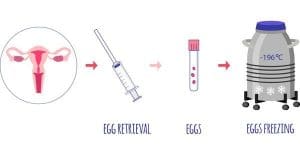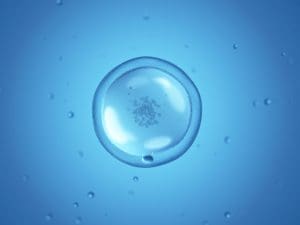Not only are fertility rates on the decline in Singapore, but couples are also choosing to get married and have children later in life. Age is an important factor affecting fertility and while you cannot stop the ageing process, there are ways to preserve fertility.
In this article, we share more about egg freezing as a way of preserving fertility.
What is Egg Freezing?

Egg freezing, also known as oocyte cryopreservation, is a process in which a lady’s eggs (oocytes) are retrieved, frozen and stored as a way to preserve the fertility of a lady who wants to conceive later on in her life.
Egg freezing enables ladies to avoid the issue of declining egg quality which is a common problem faced by women as they grow older.
Reasons Why Ladies Freeze Their Eggs
Ladies are born with all the eggs they will ever produce. Hence, as women grow older, the quality and quantity of eggs decline.
Egg freezing is a way of preserving the healthy eggs of women when they are younger and not necessarily ready to conceive just yet. There are two main reasons why ladies often opt to freeze their eggs:
1. Medical
A very common reason for ladies who want to freeze their eggs is to protect themselves from medical treatments that might affect their fertility and/or reproductive organs.
 A lady who is undergoing treatment for cancer might opt for egg freezing in case treatments such as chemotherapy and/or radiotherapy negatively affect fertility.
A lady who is undergoing treatment for cancer might opt for egg freezing in case treatments such as chemotherapy and/or radiotherapy negatively affect fertility.- Ladies who are at higher risk of getting cancer as a result of certain genetic conditions might also choose to freeze their eggs. This is because doctors may recommend removing the ovaries in order to reduce the risk of cancer developing. If ladies freeze their eggs before the ovaries are removed, they will still have the option of trying for pregnancy even after surgery.
2. Elective
Some ladies are not ready to have a baby and start a family when they are in their peak reproductive years. As a result, some may prefer to have their eggs frozen so they can try for pregnancy even after their fertility has declined. This is also known as elective egg freezing.
Egg Freezing in Singapore
Egg freezing for medical reasons is allowed in Singapore and as of 2023, elective egg freezing will be allowed too. Each patient is different and therefore ladies should always consult their doctor to find out if egg freezing is a viable option.
While there is no age limit for medical egg freezing, elective egg freezing is only available for ladies aged 21-37. To ensure ladies are able to make an informed choice, they will have to undergo counselling before their elective egg freezing procedure. The counselling session will highlight the invasive nature of the procedure, some of the limitations (no guarantee of a successful pregnancy, risks of a late pregnancy etc.) as well as the costs involved.
What is the Egg Freezing Process Like?
The steps of the egg freezing process are similar to the initial stages in an In-vitro Fertilisation (IVF) cycle.
- The lady is administered a series of hormone injections for about 2 weeks.
- She is observed with regular ultrasound scans and blood tests to determine if she is responding to the treatment well.
- When the eggs are mature, the lady will be administered a final injection.
- Then, the eggs are extracted from the lady while under sedation or a general anaesthetic.
After the eggs have been extracted, they are examined by an embryologist and the mature eggs are then frozen. Most clinics use a flash-freezing method known as vitrification that will freeze the eggs at -196 degrees Celsius in under one minute. Vitrification is the preferred method of freezing as it has a much higher “post-thaw” survival rate for eggs of over 90% compared to the old method of freezing where the eggs only had a survival rate of about 60%.
Are Eggs Harder to Freeze Than Sperms or Embryos?
Eggs are the largest cells in the human body and are largely made of water. When being frozen with the old slow freezing method, water forms ice crystals which can damage the egg. The vitrification process starts off with dehydrating the egg, to remove as much water as possible before ultra rapid freezing.
 Sperm are about 10,000 times smaller than eggs, with much less water in each cell. Therefore they are less susceptible to damage from ice crystal formation.
Sperm are about 10,000 times smaller than eggs, with much less water in each cell. Therefore they are less susceptible to damage from ice crystal formation.
Embryos are usually frozen when there are a few hundred cells. Therefore the chances of surviving the freezing process are better, as even if a few cells are damaged during the process, the other cells will survive, and resume cell division and multiplication once warmed up.
What Happens After Egg Freezing?
When the lady is ready to conceive, the eggs will be thawed and injected with sperm to achieve fertilisation. Upon successful fertilisation, the eggs are transferred to the uterus as embryos.
Common FAQs Regarding Egg Freezing
1. When is the best age for me to freeze my eggs?
Ladies should freeze their eggs before the age of 35. Fertility starts to decline after the age of 35 and this affects both the quality and quantity of the eggs.
2. How long can the eggs be kept frozen?
In Singapore, there is no time limit on how long eggs frozen for medical reasons can be kept frozen. As freezing effectively hits the “pause” button, these eggs will be just as young and healthy as they were at the time of freezing.
3. Where are the eggs kept?
Frozen eggs are kept in storage tanks filled with liquid nitrogen called Dewars. These tanks are stored in assisted reproduction centres. Some centres have sophisticated temperature monitoring systems that will send messages to the staff mobile phones if a rise in temperature is detected, enabling them to assess the situation and move the eggs to another tank if there is a problem.
4. Is egg freezing safe?
Research to date has not shown an increased risk of babies having birth defects as a result of egg freezing.
5. If I freeze my eggs, will it increase my chances of falling pregnant?
If you freeze your eggs when you are younger, you can use these healthier eggs when you are trying for a baby once you are much older.
It is important to keep in mind that using the eggs that you have frozen to try for a baby does not mean you will definitely have a baby. There are many other factors that can affect your chances of falling pregnant.
6. Is egg freezing legal in Singapore?
From 2023, the Singapore government has announced that ladies can now freeze their eggs for non-medical reasons. You can find out more here.
7. How much will it cost if I need to freeze my eggs for medical reasons here in Singapore?
The estimated cost of one cycle of egg freezing is $10,000.
 A lady who is undergoing treatment for cancer might opt for egg freezing in case treatments such as chemotherapy and/or radiotherapy negatively affect fertility.
A lady who is undergoing treatment for cancer might opt for egg freezing in case treatments such as chemotherapy and/or radiotherapy negatively affect fertility.


